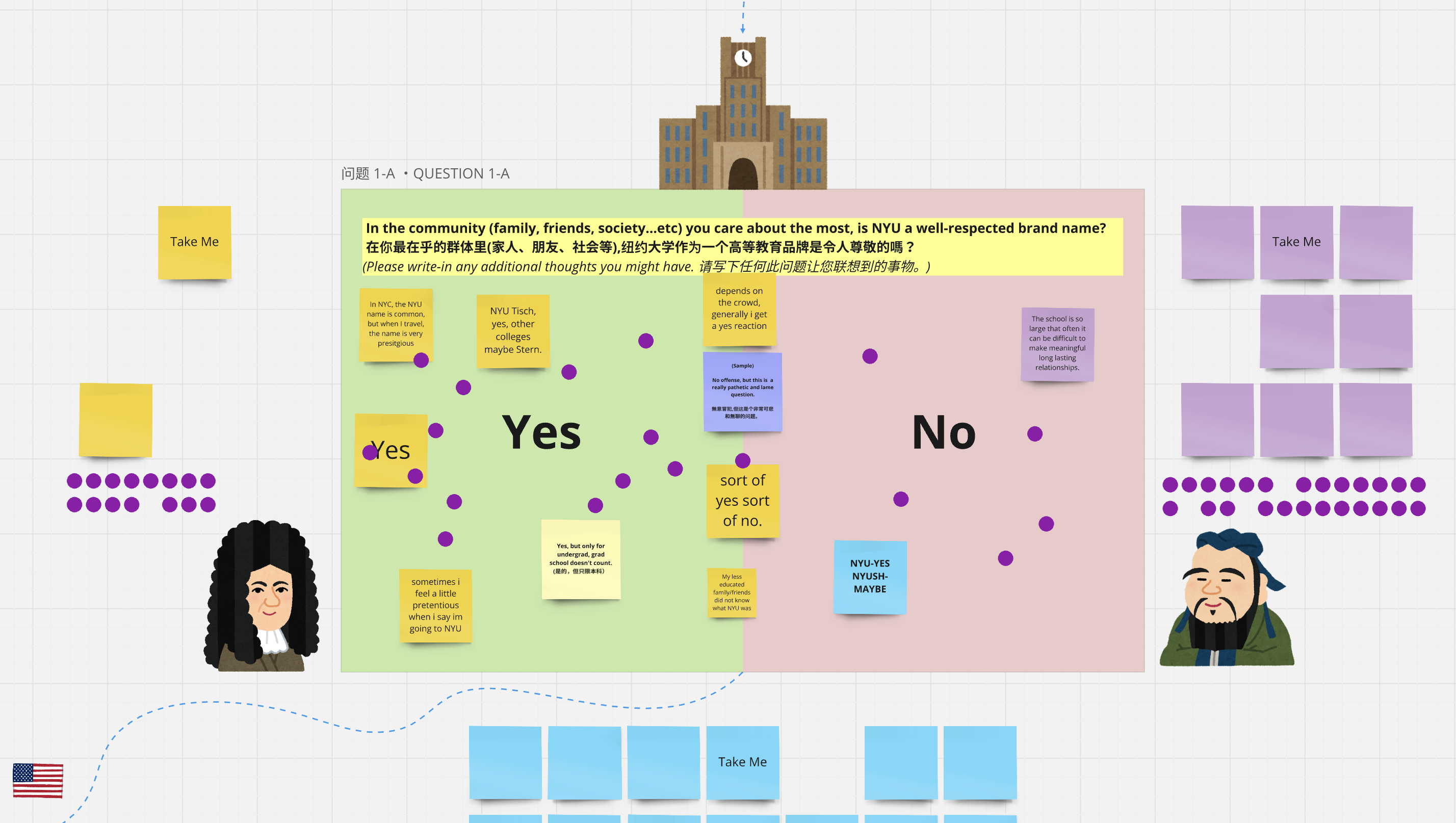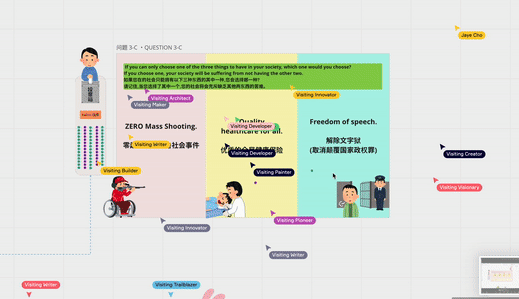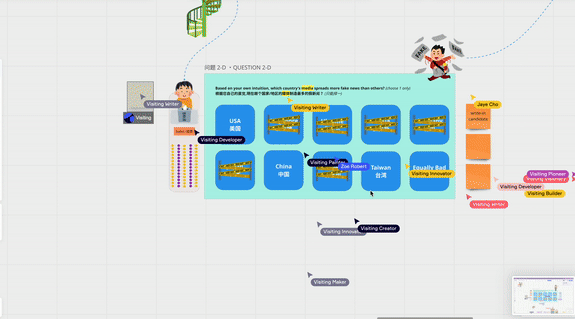A Deliberative Democracy Experiment
一場審議式民主實驗
2022-2023A digital readymade that aims to create a safe yet brave place to trigger/facilitate discussions and debates.
一個數位現成物,旨在創造一個「安全」但「勇敢」的場所,以促進討論和辯論。

This project is about navigating the duality of truth in an era that is getting harder and harder to make friends and communicate honestly without offending anyone.
這個藝術項目是關於在這個時代中探索真理的二元性。
在這個時代,在不冒犯任何人的前提下誠實交流變得越來越困難。
這個藝術項目是關於在這個時代中探索真理的二元性。
在這個時代,在不冒犯任何人的前提下誠實交流變得越來越困難。

The project is built using Miro Board, a privately owned whiteboard software/ online tool that is widely used by companies and educational institutions as a digital collaboration platform. The project's content is built using several internet-based news sources, as well as clip art illustrations from an open licensed Japanese website called Irasutoya. This particular way of building the project is my tribute to all the readymade art before me. I found the form of the project itself also connects to the recent boom in AI generative tools and the conversation around it.
這個作品使用了Miro Board來建構,Miro是一款廣泛被企業和教育機構使用的私人白板軟體/在線工具。以一個會議工具來說被廣泛使用,但是作為藝術媒介來使用並不是一件常見的事。我的這件作品的內容物來自多個互聯網新聞來源,以及一個名為Irasutoya的智慧產權開放許可的日本網站上的剪貼畫插圖。這種建構方式是我對藝術史上的現成藝術們(Readymades)的致敬。作品形式也與近期AI生成工具的熱潮和相關討論相聯繫。
Miro board became my choice of platform because of its web friendliness, intuitiveness, and its mix of high-tech and low-tech at the same time. I particularly love its sticky notes function, which allows users to stick anywhere on the board and write in. This resonates with the usage of sticky notes in creating a physical “democracy wall” during many student movements and protests globally in the past few years. I also chose Miro because of the ability to see the live actions of all other users while everyone stays anonymous. Although Miro board software comes with a built-in function to host live voting, I chose to build a visual and manual voting system because the action of each user’s computer mouse is what I find important as a part of the interaction and discussion.
我選擇Miro Board作為平台,因為它網絡友好、直觀,兼具高科技和低科技的特點。我特別喜歡其便利貼功能,用戶可以在白板上隨意貼貼並寫字,這讓我聯想到近年來全球學生運動和抗議活動中使用便利貼創建“民主牆”的做法。我選擇Miro還因為所有參與者都可以看到其他參與者的實時操作,但與此同時仍保持匿名。執得一提的是,儘管Miro自帶實時投票功能,但我選擇建立一個視覺和手動投票系統,因為我認為每個參與者的電腦鼠標的操作行為是互動和討論的重要組成部分之一。

The miro board I built is a huge treasure hunting map/game. Participants follow the dotted lines to go to various voting stations and conduct live voting together. If they don’t like their options, they can choose not to vote, or start a post-it war on the side to share their thoughts with other participants instead. Based on the partcipated group, I start each map/game with some specfiic, relevant ice-breaker questions. For example, during a session with students and faculty from a graduate program at the New York University with roughly 70% Americans and 30% Chinese partcipants, I started up with some maybe awkward but maybe funny NYU brand name ROI question for people to vote on.
我建的Miro Board 作品是一個大型尋寶地圖/遊戲。參與者沿著虛線前往各個投票站,並一起進行現場投票。如果他們不喜歡選項,可以選擇不投票,或者在旁邊開始便利貼戰爭,與其他參與者分享他們的想法。根據每場投票參與者群體的不同,我會用一些具體且相關的破冰問題來開始每張地圖/遊戲。例如上圖,在與紐約大學研究所裡的學生和教職員進行活動時,因為事先知道大約70%的參與者是美國人,30%是中國人,我使用了雙語並且問了一些可能尷尬但有趣的紐約大學品牌價值問題讓大家進行投票。在下面的範例中,我接著用雙語問了一個假設題,主要在「逼迫」參與者在美國社會問題和中國社會問題中作出抉擇,屆而做到反思以及對於社會上的各種理所當然的激辯。


A little bit background about the project: Growing up, my family constantly fought over political differences. The fights got intense often, and I remember hiding in the bedroom, praying the sounds of quarreling would end soon. As a result, as an adult, I became proudly politically indifferent, seeing anyone who engaged in political activities as a fanatic. However, as the old saying goes: “Just because you do not take an interest in politics doesn't mean politics won't take an interest in you.” It took me a decade of trying to escape from understanding politics to realize that freedom should not be taken for granted. Without us exercising the civic duty of maintaining, challenging, and participating in thoughtful democratic discussions and decision-making, the freedom we enjoy in everyday life can disappear in an instant.
在成長過程中,我的家庭經常因為政治分歧而爭吵,我的媽媽是國民黨員,我的爸爸是民進黨員,而且兩人皆非常參與各自黨內的活動。爭吵常常變得非常激烈,我記得自己躲在臥室裡,祈禱爭吵聲能快點結束。(現在回想,他們究竟如何成為戀人甚至夫妻真的是很神奇的事。)因爲這樣的成長環境,長大後的我曾經驕傲地對政治極度冷感,認為任何參與政治活動的人都是狂熱分子。然而,正如古話所說:「你不關心政治,並不代表政治不會關心你。」我經歷了數十年的時間逃避理解政治,才意識到自由不應被視為理所當然。如果我們不履行公民責任,維護、挑戰和參與深思熟慮的民主討論和決策,我們日常生活中享有的自由可能會在不注意的瞬間消失。


The advancement of social networks, and generative AI tools, while bringing many conveniences to our lives, have also made fake news more and more natural. The line between fact and fiction is now completely blurred, as is the line between truth and fake. The ability to arrive at a “fact” that most people can agree on seems almost impossible.
社交網絡和生成式AI工具的進步,雖然為我們的生活帶來了許多便利,但也使假新聞變得愈發普遍。事實與虛構之間的界限現在完全模糊,真相與虛假之間的界限亦是如此。達成大多數人都能同意的“事實”的能力似乎變得幾乎不可能。
社交網絡和生成式AI工具的進步,雖然為我們的生活帶來了許多便利,但也使假新聞變得愈發普遍。事實與虛構之間的界限現在完全模糊,真相與虛假之間的界限亦是如此。達成大多數人都能同意的“事實”的能力似乎變得幾乎不可能。


Even within a like-minded group, having earnest conversations on societal topics had also become difficult, especially with cancel culture as the dominating solution for resolving a conflict. Surrounded by these situations in my daily life, I set this project as a journey to explore tools and methods that can possibly help initiate and/or facilitate honest conversations on complex topics within groups of people.
即使在志同道合的群體中,真誠地討論社會話題也變得困難,尤其是在取消文化成為解決衝突的主流方法時。在這些情況環繞的日常生活中,我設立了這件互動作品,旨在探索可能幫助促進對複雜話題進行誠實對話的環境。
Additional:
This project was also introduced as a thesis / work in progress in a 10-min presentation in June 2023. The video provides a more personal glance behind the scene that led to the formation of this project and idea.
即使在志同道合的群體中,真誠地討論社會話題也變得困難,尤其是在取消文化成為解決衝突的主流方法時。在這些情況環繞的日常生活中,我設立了這件互動作品,旨在探索可能幫助促進對複雜話題進行誠實對話的環境。
Additional:
This project was also introduced as a thesis / work in progress in a 10-min presentation in June 2023. The video provides a more personal glance behind the scene that led to the formation of this project and idea.